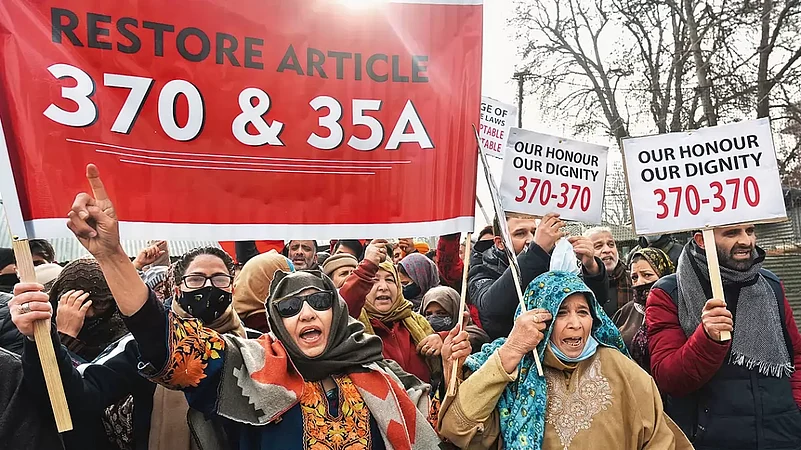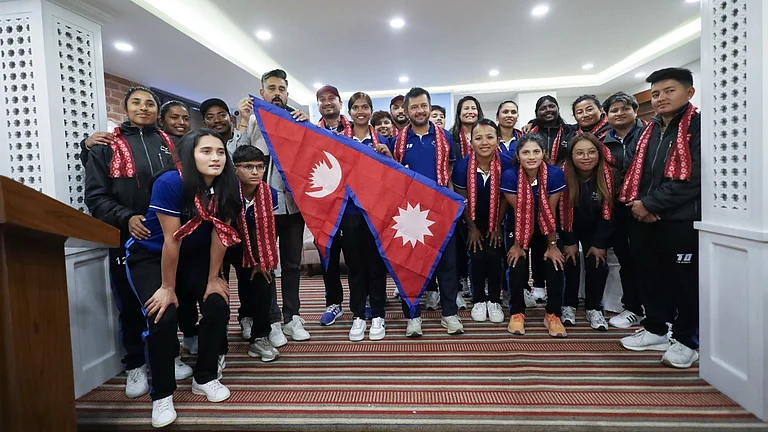As the Centre defended the abrogation of Article 370 of the Constitution of India in the Supreme Court by saying that Jammu and Kashmir has since witnessed an "unprecedented” era of peace, progress, and prosperity, the political leaders in Jammu and Kashmir said that the Centre's affidavit was more of a political document than a legal document.
The Supreme Court on Tuesday said that it will start day-to-day hearing in the case of petitions challenging the abrogation of Article 370 on August 2. A five-judge bench of the SC head by Chief Justice DY Chandrachud set July 27 as the deadline for the concerned parties to file their responses in the case.
The case is related to the clutch of petitions challenging the abrogation of Article 370 on August 5, 2019. With the abrogation, the special status of Jammu and Kashmir was scrapped. In a second action that day, the state of J&K was bifurcated into two Union Territories (UTs) of J&K and Ladakh.
In an affidavit defending its actions, the Centre said "unprecedented” era of peace, progress, and prosperity has emerged after the actions with street violence, orchestrated by terrorists and secessionist networks, becoming "a thing of the past". Former J&K Chief Ministers Omar Abdullah and Mehbooba Mufti have said that the affidavit is more of a political document than a legal one.
“These are definitely political arguments the BJP/Union Govt can make to sell their decision to the voter but they are not legal arguments. The entire case in the SC is about the illegality & unconstitutionality of what was done on 5th Aug 2019, not whether the Govt has a strong enough political case,” said Omar.
People's Democratic Party (PDP) President Mehbooba Mufti said that the Centre’s defence lacks logic to back its decision of the illegal and unconstitutional abrogation of Article 370.
“Brute majority was used to subvert the Indian constitution that extended guarantees to the people of J&K and government also violated earlier rulings of Hon’ble SC which held that only J&K’s constituent assembly could recommend the removal of Article 370 to the President of India. Drum beating about an enforced silence and so called grassroots democracy cannot be used to justify constitutional hara-kiri,” Mehbooba said.
The Centre has submitted that since 2019, the entire region has witnessed an unprecedented era of peace, progress and prosperity. The Centre has said life has returned to normalcy in the region after over three decades of turmoil. It has said schools, colleges, universities, hospitals, and other public institutions are functioning efficiently without any strikes or any kind of disturbances during the past three years. The earlier practice of daily hartals, strikes, stone pelting, and bandhs are things of the past now.
The Centre's affidavit said that after the democratically-made constitutional changes, major steps were taken to strengthen grassroots democracy.
“For the first time in its history, a duly elected 3-tier panchayati Raj System has been established in Jammu and Kashmir. Elections for the members of the District Development Councils were held in Jammu & Kashmir in November-December 2020. As of today, there are more than 34,000 elected members to the rural and urban local bodies representing grassroots democracy,” said the affidavit.
The Centre said roads, bridges, buildings, irrigation, justice delivery, public health and hospitals, water and electricity, public transport, and communication were all negatively affected.
“Post abrogation, with bandhs and street violence having almost become a thing of the past, accountability in the administration has a vastly record number of public works having been improved with executed that are verifiable by way of GPS connected time and date stamped videos and still photographs taken before and after execution,” the government said. “That ensuring safety and improving the quality of life for people in Jammu & Kashmir a top priority of the government. The government has adopted a policy of zero tolerance against terrorism. That the government has adopted various countermeasures to neutralize the efforts and capabilities of terrorists to disturb peace in the region.


























